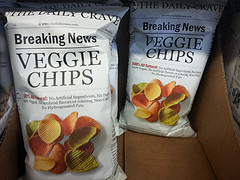Potato chip alternatives with clever packaging, pictures of vegetables, and healthy-sounding names like “Terra Exotic Vegetable Original” are becoming more popular. Vegetable varieties are the most common, but new additions to the market feature lentils or beans among their ingredients. Are they a healthy snack option?
The Evidence
Some of the veggie and bean chips have more fiber and less sodium than regular potato chips, but you’ll need to check nutrition labels, since this isn’t true for all brands. Most veggie chips are still fried, and the fat and calorie amounts are similar to regular potato chips (per ounce – about 12 chips – about 130-160 calories and 10 g fat). Baked varieties will have fewer fat and calories.
Adding healthy ingredients does not necessarily make a food healthy. Processing veggies destroys some vitamins and protective compounds, and the actual amount of vegetable in some of the chips is questionable (I’m not counting potatoes!). Also to consider is the health halo effect: packaging with health claims can encourage people to eat more of these chips because they think they are a healthy snack, or they don’t feel guilty eating them.
Bottom Line
Veggie chips are a highly-processed food, and clever marketing makes these chips seem like a healthful snack option. Although some varieties have less sodium and more fiber than regular chips, they don’t offer many nutritional benefits. Eat them in limited quantities if you enjoy them, but don’t fool yourself into thinking they are healthy, or replacing vegetables.
>>You can view other foods in the Healthy or Hype? series here.
About the Healthy or Hype? series:
In this series, I’ll be looking at popular foods to see if they stand up to the hype or health claims behind them.
Media reports, company marketing efforts, and self-proclaimed experts can make interpreting nutrition and health news confusing. These outlets recognize that people are drawn to exceptional or miraculous stories that elicit an emotional response. Beyond stories and anecdotes, many “experts” are now citing studies (often out of context) to back up their claims, making it even more difficult to separate fact from fiction.
Finding out “what works” isn’t usually the result of a single study, but often years of research from various disciplines. It’s critical to synthesize all the scientific evidence to create a coherent picture. Good science is the best tool that we have to figure out how something is influencing our health.
photo credit: allaboutgeorge via photopin cc Share This: